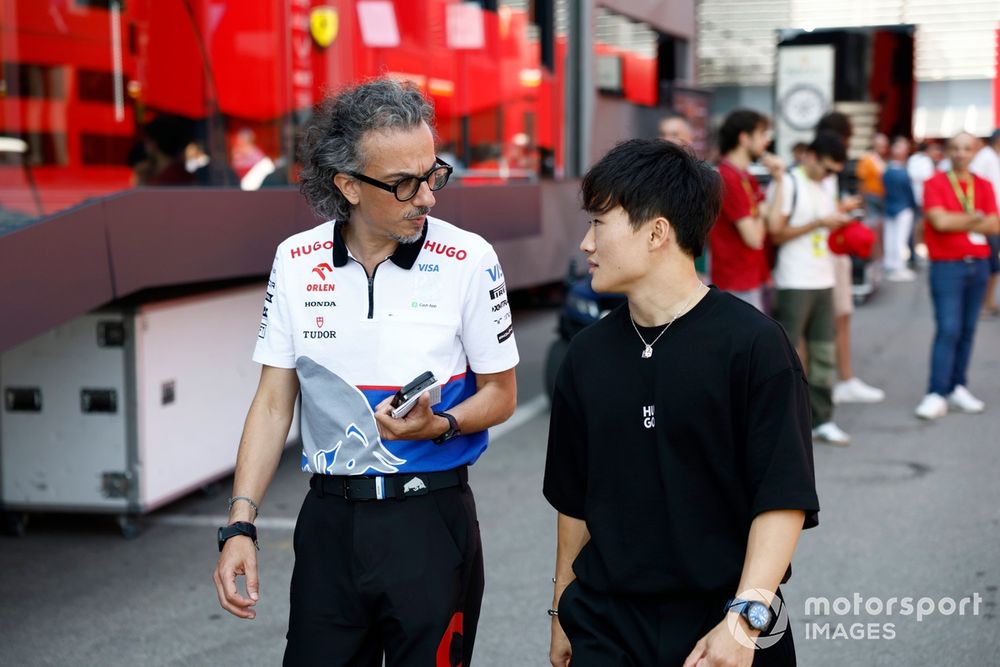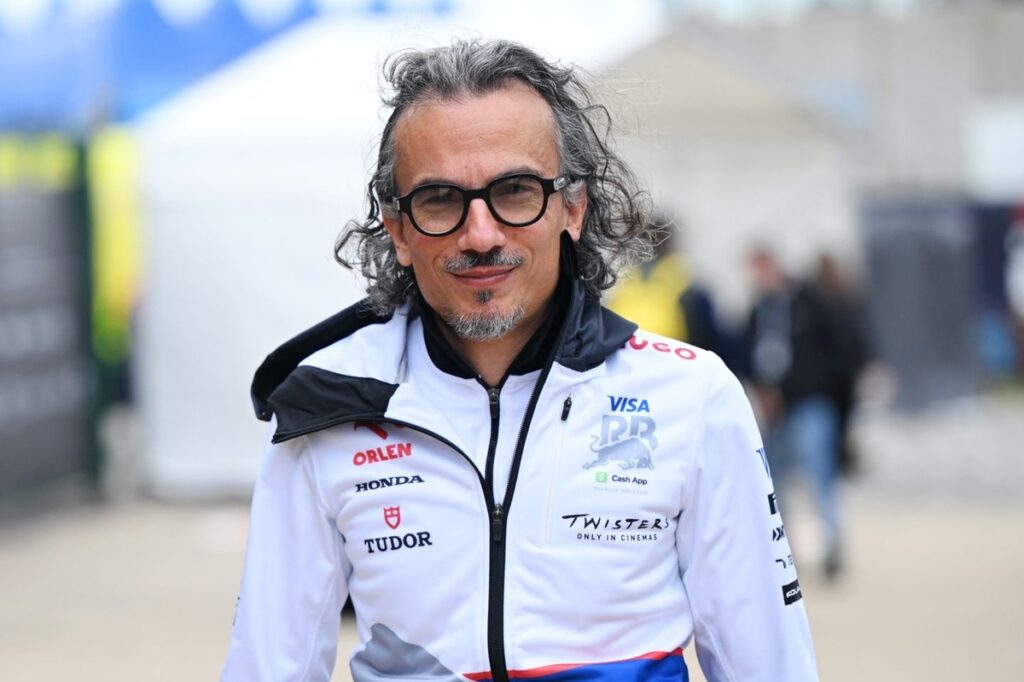Laurent Mekies has big shoes to fill as Christian Horner’s successor as Red Bull Formula 1 chief, after the former Racing Bulls, Ferrari and FIA man was confirmed in the role on Wednesday.
After the surprise announcement of Horner’s dismissal, Red Bull Racing will get its second CEO in its entire existence in the form of former Racing Bulls team boss Mekies.
Working across engineering and management roles at a smaller squad, a top team and the championship’s governing body, the well regarded Frenchman boasts a wealth of experience.
Mekies started at minnows Arrows and Minardi as an engineer before stints at the FIA and Ferrari, where he later became sporting director, before returning to his old team in Faenza as team principal at the start of 2024.
He will be able to put all that multifaceted experience to good use as he takes on his most high-profile job yet at a sprawling Red Bull campus that also includes Red Bull powertrains, and there is a big list to crack on with as the 48-year-old gets his feet under the desk.
Convincing Max Verstappen
Horner’s removal is almost certainly connected to a power struggle between him and the Austrian side of the business, which had been bubbling away for a few years now. And with Max Verstappen’s long-term future at the team at stake, it looks as though Horner came off second best and lost the shareholders’ confidence that, despite his past successes, he would be able to stop the rot and turn the team’s fortunes around in the wake of losing Adrian Newey and other key members.
Max Verstappen, Red Bull Racing
Photo by: Jakub Porzycki / NurPhoto / Getty Images
At present it is unclear whether or not Mekies will be given the same wide ranging remit that Horner carved out in the latter years, but his first priority must be to ensure Verstappen is on board with his vision of what it will take for Red Bull to get out of its rut and what its technical structure should look like, both in the factory and trackside.
Whether or not that is enough is up to the world champion and his entourage. And while some members of said entourage may be glad to see the back of Horner, they may also opt to wait and see if Mekies is the right man to turn things around in the long term.
Fixing the second seat problem, supporting Yuki Tsunoda
It now looks certain 2025 is not going to bring about a sweeping reversal of fortunes with the RB21, with Verstappen and Red Bull in the mix at certain circuits but largely unable to keep up with the McLarens on the whole.
The 2026 season could also be compromised as Red Bull Powertrains fights to keep up with the established power unit manufacturers. Installing Mekies now gives the Frenchman as much time as possible to make course corrections if needed.
At the same time, second driver Yuki Tsunoda will need to have his confidence rebuilt after struggling as Verstappen’s team-mate over his first 10 races, much like the drivers that came before him.
Horner was always less convinced about Tsunoda but Mekies is a big admirer, with the pair having worked together closely at Racing Bulls, and will no doubt give the Japanese driver the support he needs.

Laurent Mekies, Team Principal, RB F1 Team, Yuki Tsunoda, Visa Cash App RB F1 Team
Photo by: Zak Mauger / Motorsport Images
Again, there is unlikely to be a major breakthrough this year given the narrow operating window of the ground effect RB21 is baked in, but next year’s sweeping regulation changes are an opportunity to finally fix Red Bull’s second seat problem.
A fresh perspective on Red Bull’s tech structure
After losing Newey, Rob Marshall and Jonathan Wheatley, who for various reasons felt it was time to move on, you could argue Red Bull could do with a statement signing in its technical department as it aims to get back on top, changing the narrative of a senior member exodus. Not being able to keep together the key pillars responsible for Red Bull’s success was one factor held against Horner.
At the same time, a lot of extremely talented people who were responsible for its title success in 2022 and 2023 are still there. And if McLaren’s resurgence under Zak Brown and Andrea Stella has taught one thing, then it’s not only a case of poaching talent from other teams but also ensuring the people you already have are firing on all cylinders.
In McLaren’s case it did snap up Marshall from Red Bull, but it also unleashed long-time aero genius Peter Prodromou in a more prominent role as it tweaked its technical hierarchy.
Red Bull’s performances in isolation have perhaps not been a sackable offence, with Verstappen still winning two races thus far in 2025, but questions have to be asked why it was so emphatically left behind by McLaren and why only Verstappen seems capable of driving its cars.
Not helped by correlation issues with its old windtunnel, Red Bull has struggled to develop its way out of its problems over the past 18 months. Considerations could include whether technical director Pierre Wache needs more support in the role, with Mekies already embarking on a similar restructuring exercise at Racing Bulls after tech director Jody Egginton’s departure earlier this year.
Oliver Mintzlaff, Managing director Red Bull GmbH, Christian Horner, Team Principal, Red Bull Racing, Dr. Helmut Marko, Consultant, Red Bull Racing
Photo by: Red Bull Content Pool
Speaking as recently as last Friday, Horner insisted there was no need for change despite competitors moving towards a more horizontal structure.
“I think every team structure is different,” he said. “At Red Bull Racing, I have a clear structure that reports into me, where you have the main faculties that report into me.
“Pierre Wache probably performs 80 percent of the role that perhaps Andrea Stella does at McLaren. It’s just a different job title, different functions, different set-up.
“It’s a set-up that’s worked incredibly well for us on track and off track. We got strength in depth. I certainly don’t feel that there’s a need to change or tune it.”
Safeguarding Red Bull’s company culture
While Horner lost a power struggle at the top level, he was by all accounts well regarded on the factory floor in Milton Keynes, with staff giving him a long applause after his emotional farewell speech on Wednesday morning.
From his variety of roles elsewhere in the paddock, Mekies is well aware company culture is everything in F1. And as he and Racing Bulls CEO Peter Bayer implemented a location free approach across Faenza in Italy and its new Milton Keynes campus, he made sure that the distance between the two factories was not a debilitating factor for the 700-employee organisation by putting together a strong leadership team that communicates closely across the two headquarters.
Sergio Pérez, Christian Horner, Max Verstappen at the Red Bull factory in Milton Keynes
Photo by: Red Bull Content Pool
He now faces his biggest challenge yet to manage an even bigger workforce as both team principal and CEO, whereas he previously split duties with Bayer at the smaller Racing Bulls squad. He will also have to manage its nascent relationship with engine partner Ford.
Knowing the Red Bull ecosystem and its unique dynamics so well, as well as a lot of Red Bull staffers who first plied their trade at the satellite team before being snapped up by Red Bull Racing, will give Mekies a big head start.
Making the change now rather than during the summer break also gives him a few weeks to get his feet under the desk at Milton Keynes before the mandatory summer shutdown in August makes it harder to affect change.
Navigating a political minefield
F1 is called the ‘piranha club’ for a reason and by stepping up to the big leagues, Mekies will experience the full brunt of that. Being at the top of the food chain over the past few years, Horner regularly clashed with his direct challengers – first Mercedes counterpart Toto Wolff and more recently with McLaren’s Zak Brown – while he passionately defended Red Bull’s interests on and off the track. Brown always said his clashes with Horner were “nothing personal, just business”, but that has always seemed a half-truth at best.
But the affable Mekies is not a divisive figure, so one would expect him to entertain cordial relations in the same vein as his former Ferrari boss Fred Vasseur is able to do. And with Red Bull no longer the dominant force that rivals are actively trying to tear down, perhaps Mekies will be afforded a longer honeymoon period as he steps into the role.
Make no mistake though, he must, and will still, be fighting his corner hard when he needs to, and from his roles at Ferrari and the FIA he has seen all sides of the political game.
There are still several off-track battlegrounds for Red Bull to fight, with Horner having been keen on seeing tweaks to 2026’s energy deployment rules, as well as catch-up mechanics to allow engine manufacturers extra development time – and budget if they are falling behind. Those ideas have been agreed in principle, but have yet to be quantified and voted through.
Whatever may happen next, Horner’s departure really is the end of an era, having been by far the longest serving team principal on the grid. Now Mekies will have big shoes to fill to put his own stamp on Red Bull’s F1 identity but, like his Racing Bulls replacement Alan Permane, he is an experienced and shrewd hire.
In this article
Be the first to know and subscribe for real-time news email updates on these topics
Subscribe to news alerts
Read the full article here

